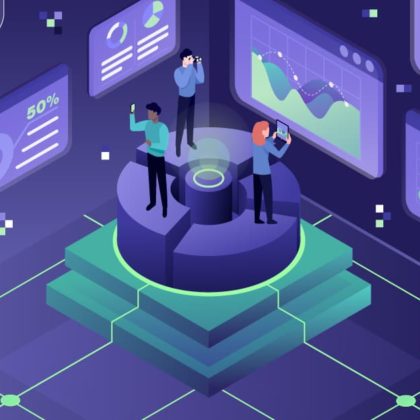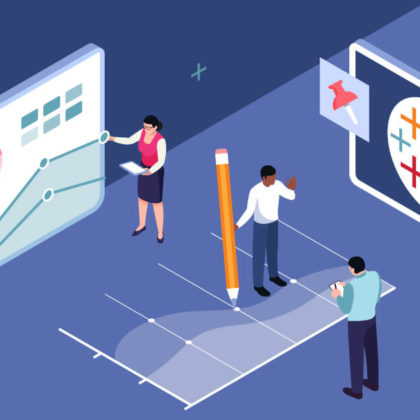Become a Business Intelligence Analyst

In 2020, business intelligence (BI) analysts will have access to more data sources than ever before.
This seismic shift has made companies around the globe reliant on BI to drive revenue and sales, gain competitive advantage, and so much more. But this also makes it harder than ever to manage, process, and analyze their data.
With 72% of companies considering business intelligence tools to be important to their daily operations, the BI industry is clamoring to hire BI Analysts to make sense of their data.
And that’s where you come in.
Demand for qualified business intelligence analysts is expected to soar to 14% by 2026.
BI Analysts are responsible for identifying high-impact insights and making game-changing decisions for every sector of your business.
But with great power comes even greater responsibility, and a BI analyst who expects to land their dream role must equip themselves with both the technical and soft skills it takes to make such high-stakes decisions.
Read on to learn more about this popular role, including the skills and requirements you need to land a BI role, and how to succeed in this exciting field of data science.
Let’s get started…
What is Business Intelligence?
Business intelligence is defined as the set of insights derived from data analysis and the management of information within an organization. These insights are vital to help stakeholders make informed decisions across all areas of business, from marketing to sales, logistics, human resources, and more.
The Responsibilities of a Business Intelligence Analyst?
A Business intelligence analyst is responsible for communicating information of high-value to support decisions across the company. The BI analyst is also tasked with working alongside multiple departments, information managers, key stakeholders, and external service providers to continually drive business development at all levels.
In large organizations, the BI analyst is expected to possess a level of Big Data knowledge and inform data handling decisions in order to support improved intelligence outcomes.
A typical day in the life of a BI Analyst involves collecting business data, analyzing it, and then sharing insights and final conclusions with the appropriate audience. Your daily tasks may include:
- Collecting business data: sources of collections may include industry reports, public data, field reports, or purchased third-party findings.
- Storing the data: this may involve conducting regular updates, developing operational procedures to utilize the database, and providing technical support.
- Analyzing & visualizing the data: utilize data analysis and visualization tools like Tableau, Microsoft Power BI, or Qlik Sense to analyze and visualize your data and drive definitive conclusions.
- Communicating results: summarize your findings and communicate them to key stakeholders.
Essential Skills of a Business Intelligence Analyst
Being in the driver’s seat of high-stakes decision-making requires strong data analysis and communication skills. Do you have the top BI skills employers are looking for?
This role involves analyzing data sets, visualizing insights, cross-team cooperation, and extensive project management.
But the ability to master the technical side of BI while honing your soft skills is where the magic happens.
While technical skills like data analysis skills and proficiency in BI tools such as Tableau, Power BI, and Qlik Sense are vital to get hired, soft skills also make the list of essentials for BI analysts and should not be underestimated in your data science toolkit.
Let’s take a look at both sets of required skills:
Soft Skills for the Business Intelligence Analyst
Business Acumen & Industry Knowledge:
Learning the ins-and-outs of industry and business helps BI analysts uncover deeper insights, provide in-depth analysis, spot data blind spots, and recognize market changes sooner.
While BI newcomers can grow and diversify their business acumen and industry knowledge through real-world and practical courses in the BI Analyst Learning Path, this soft skill is also honed through years of on-the-job experience.
Communication & People Skills: BI isn’t all about the data. Becoming an effective listener and communicator, and knowing when to ask the right questions will help you understand the nuances that exist in BI requests — no matter which department or team you’re working with.
People skills, in particular, will help you navigate the choppy waters of cross-functional department politics that develop when key stakeholders or teams are unwilling to share information or develop agendas that are misaligned with optimal outcomes.
In fact, communication is so vital to the success of a BI project that in 2012, Gartner reported that 70% of BI projects failed partly due to a lack of communication.
Big Picture Thinking & Detail-Oriented: much of a BI analyst’s work lies in the minutia of complex data, but getting bogged down by the details might obscure your eye on the company’s vision. Maintaining both a big picture perspective and a perfectionist’s eye guarantees the best results.
Problem-Solving: BI analysts need to analyze data and provide clear and confident solutions to help the company make value-driven decisions. As an essential part of any BI role, hiring managers will assess your ability to identify and prioritize problem areas, research and manage large projects, and finally, problem-solve creatively.
Continuous Learning: as in any data science field, BI is an evolving space. New tools, techniques, and approaches are introduced regularly, and keeping up with emerging developments is part of the job.
Technical Skills for the Business Intelligence Analyst
Statistics: while modern BI platforms allow you to bypass the complex theory behind data analysis, building a solid understanding of statistical theory will set you apart and boost your critical thinking abilities.
Database theory & SQL: the IT portion of the BI analyst role requires a firm foundation of database theory that will benefit your career in the long-run. You also need to be proficient in database creation and maintenance and be able to design advanced SQL queries.
Programming Skills: programming skills are required to handle the load of datasets and automate workflows. Python and its data manipulation libraries pandas, matplotlib, and scikit-learn are powerful tools for structuring and analyzing data.
Tableau, Power BI or Qlik Sense: while knowledge of Excel and SQL are always great to include on your resume, mastering next-generation tools like Tableau, Power BI, and Qlik Sense, and their advanced business analytics capabilities are a must! As leaders in the Gartner Magic Quadrant, these tools are now industry-wide standard tools in any modern workplace.
Training, Education and Additional Requirements
Traditional Education
A career as a BI analyst requires a degree in business, information technologies, or computer science. Additionally, if you want to climb the career ladder, an MBA will help you fast-track the journey.
These days, however, employers recognize online education more than ever and increasingly place more weight on training included in SDS Club’s Learning Paths. These courses keep pace with a fast-moving industry and its many technological advancements; present highly-targeted curriculums, and deliver more real-world business knowledge than traditional education ever could.
Certifications
Formal education isn’t the only requirement that will set you apart on the job market.
In an industry where mastery of complex and robust BI platforms can produce big results, knowing your way around leading BI tools like Tableau, Power BI or Qlik Sense are highly valuable skills.
But how do you prove this on your resume? The answer is simple — certification.
Upon completing each course in the BI Analyst Learning path, you receive a certificate of completion that can be mentioned on your resume or included on your LinkedIn profile. Our courses also prepare you to pass certification exams for each of these leading platforms.
In particular, our Tableau 2020 Certified Associate Exam Guide (A-Z) course prepares you to pass the Desktop Specialist and Certified Associate Exams. Plus, it comes with a guarantee: If you don’t pass on your first try, we pay for your second attempt!
According to Entrepreneur Magazine, Tableau is one of the “top 20 skills to learn now and hit the ground running in 2020,” and a must-have skill for any BI analyst. The platform is the best visualization tool for anyone who wants to explore data since it involves minimal coding, and offers easy ways to manipulate data in a powerful drag-and-drop format.
Adding an official certification to your resume provides you with global and industry-wide proof of your platform skills.
Portfolio
When it comes to BI portfolios that attract attention from hiring managers, you will need to demonstrate that you have the required skills previously mentioned.
The types of projects, datasets, tools, and reports to showcase in your portfolio should be tailored to the industry and job description. For example, if the role utilizes the Tableau platform only, include projects that show off your grasp of the platform’s latest features and the most state-of-art visualization techniques available.
The Tableau collection of courses in our BI Analyst Learning Path will help you build a portfolio of real-world BI projects that are designed to impress on the job market. Check out a few of the projects included in the courses of this Path:
- Tableau 2020 Certified Associate Exam Guide A-Z: this course includes hands-on, real-world projects that utilize datasets from Spotify, Airbnb, Kaggle, WorldBank, Glassdoor, NBA, Rotten Tomatoes, Kiva Loans – Datasets Included This Course!
- Tableau Expert: Top Visualization Techniques in Tableau 10: master visualization techniques including Sankey Diagrams, Viola Charts, and more.
Alternatively, if Qlik Sense or Power BI are your tools of choice, the BI Learning Path also includes masterclass courses that guide you step-by-step in solving real-world challenges with these leading platforms.
BI Analyst vs. Data Scientist – What’s the Difference?
While an organization needs both BI analysts and data scientists to optimize the use of its data, a BI analyst focuses solely on interpreting historical data and trends. As a BI Analyst, you will be tasked with piecing together the puzzle of your company’s past “events.”
Despite this small but significant difference, both roles:
- Are crucial for maintaining the financial health of a company
- Are in high-demand by companies around the world
- Are linked to high-paying salaries, which we will explore next!
If you think the role of data scientist suits you better, explore our Data Scientist Learning Path, here.
Expected Salary for Business Intelligence Analysts
BI analysts are among a company’s most valuable employees, which is why BI roles attract such high salaries.
According to Indeed, the average salary for a BI analyst is $94,365 year. Meanwhile, a senior BI analyst will earn on average $130, 513.
BI Analysts who hold database development, data warehousing and requirements gathering skills earn up to 52.48% compared to the competition.
Start Your BI Journey
Whether just you’re starting out in BI or making a strategic career move, SDS Club’s BI Analyst Learning Path helps you transition into this exciting field seamlessly. Containing 8 courses, 70 hours of content, and covering 3 leading data analysis platforms (Tableau, Power BI and Qlik Sense) your career in BI is easily within sight.
Signing up for the BI Analyst Learning Path gives you a front-row seat to expert learning from the BI industry’s leading instructors:
- Data Scientist, Kirill Eremenko
- Analytics Lead, Jean-Pierre Labuschagne
- Tableau Consultant and Analytics Educator, John David Ariansen
- Oxford MBA and Tableau Professional, Ben Young
Start your BI Analyst Path today. Enroll in targeted courses, receive multiple certificates of completion, and gain the confidence to excel in the BI boardroom and beyond. Sign up today.



